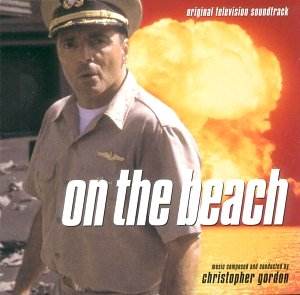| **************************************************************
EDITOR’s RECOMMENDATION September
2000
************************************************************** |
Christopher
GORDON
On The Beach
 Original Televison Soundtrack
Original Televison Soundtrack
 VARÈSE SARABANDE VSD-6153
[73:49]
VARÈSE SARABANDE VSD-6153
[73:49]
Crotchet
Amazon
UK
Amazon
USA

Welcome to that which makes it all worth while. This monumental album, divided
into six sections, is Christopher Gordon's score to the Hallmark mini-series
version of Neville Shute's classic science fiction novel of nuclear war and
the appalling aftermath. Previously filmed in 1959 in a truly exceptional
feature film version starring Gregory Peck (music from which is on Ernest
Gold: Film Themes and Suites, which I also review this month), Hallmark
continue their policy of seeking out fine composers to give their TV productions
decidedly superior scores. Gordon is previously only really known for his
music for Hallmark's Moby Dick (1998), so I am still fairly stunned
to say that while I can not vouch for how effective this music is as
television music, as a stand-alone soundtrack album it is simply
amazing. It is quite the best new soundtrack album I have so far heard this
year, massively outstripping the latest from such giants of the film music
world as Williams, Horner, Morricone, et al.
First the facts, then I'll tell you why it's so great, then you go and buy
it. Please. Trust me on this one. There are 27 tracks in almost 74 minutes.
A few are very short, the shortest, "Homecoming" and "At the Taj Mahal" running
only 47 seconds each. However, there are also big, set-piece cues with much
more extensive running times. Despite the large number of tracks this is
an exceptionally well structured album which flows very nicely and never
feels fragmented, because even the shortest cues function as self-contained
pieces of music. This is a score for large (un-named, presumably 'pick-up')
orchestra and on a few tracks, choir. The Sydney Philharmonia Choir, from
which one might make an educated guess as to where many of the musicians
come from.
Now while the orchestra is un-credited, unusually there are seven soloists
acknowledged by name. And here is the first key to the success of the score.
The music is not just conducted by the composer, but orchestrated by Mr Gordon
too. No team of orchestrators here, racing against a release date and ensuring
a bland uniformity of sound. This has made a huge difference, for this is
a thoroughly composed work. As in the best scores of Ennio Morricone (not
coincidentally famed for always orchestrating his own music) the instrumental
detail is integral to the impact of the music. Christopher Gordon writes
for his soloists, and what fine soloists they are. He ranges from full orchestral
passages to the most intimate sequences. There is big war/militaristic music
which succeeds in being noble, rousing and harrowing, all without ever resorting
to the sort of clichés which lesser composers fall prey to. There
are coruscating choral passages for the end of the world as we know it, and
there is music which ranges from the impressionistically romantic to the
utterly desolate, scored for alternately violincello, viola, horn, trumpet,
harp, piano and child soprano. At the emotional heart of the score is the
profoundly emotional violincello playing of David Periera, 'Elegy' evoking
the spirit of Elgar to enormous effect. Elsewhere the score ranges from the
English folk-inspired 'Moira and Towers Meet', which strangely seems to summon
images of Rachel Portman's Emma, to the neo-West Side Story
Bernstein orchestral jazz of 'The Great Ocean Road' through the Hovhanessesque
swirling arpeggios of the climax to the muscular set-piece 'Anchorage'. 'Flight
Through the Apostles' is utterly exhilarating, one last moment of joy and
glory before the shattering final tracks which take the music truly into
the heart of darkness.
By modern standards this is an enormously diverse and complex score. It is
beautifully crafted in every detail and gorgeously romantic in the best possible
sense. It has the epic melodies so beloved of fans of Williams and Goldsmith,
the corrosive, implacable power of Herrmann, and a personality, despite my
noting possible influences, all its own. My only criticism is that when the
solo parts come in there is sometimes a marked rise in background noise in
a way which just should not happen today. Still, it barely detracts from
what is a magnificent achievement. Though living in Australia, Christopher
Gordon is an English composer, and it is clear he is following in the very
best British film music tradition, that of Vaughan-Williams, William Alwyn,
John Scott, Christopher Gunning. This is real film music. This is real music.
Quite simply, a score to take its place not just as the best of this year
so far (and I can't imagine anything bettering it out of what is still to
come), but as one of the all time film music greats. An absolutely essential
purchase.
Gary S. Dalkin

FilmScore Monthly
reports
rave reviews but a total sale of under 150copies
![]()
![]()
![]()
![]()
![]()
![]()
![]()
![]()
![]()
![]()
![]()
![]()
![]()
![]()
![]()
![]()